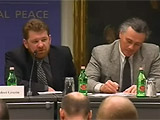Registration
You will receive an email confirming your registration.

The session, part of the Carnegie Endowment's day-long program of events to launch its New Vision, examined the national interests and strategies of the U.S., Russia, and China in the region. Has a new Great Game taken shape? What kinds of competition and what degree of cooperation can be expected? How will political and social dynamics within Central Asia affect the plans of the great powers?
![]()
 |
Introduction by Martha Brill Olcott |
 |
Remarks by Ambassador James F. Collins |
 |
Remarks by Sun Zhuangzhi |
 |
Remarks by Andrei Grozin |
 |
Remarks by Zhao Huasheng |
 |
Remarks by Dmitri Trenin |
 |
Q & A |
The session supports the launch of the Carnegie Endowment's New Vision and joins events held that day by the Endowment's Middle East and Nonproliferation programs. The Carnegie Endowment for International Peace pioneered the idea that in today's world a think tank whose mission is to contribute to global security, stability and prosperity requires a permanent international presence and a multinational outlook at the core of its operations.
Building on the experience of its presence in Russia with the Carnegie Moscow Center, the Endowment has launced centers and programs in Beirut, Beijing and Brussels staffed by native scholars and voices. Carnegie now aims to transform itself from a think tank on international issues to the first truly multinational -- ultimately global -- think tank.
